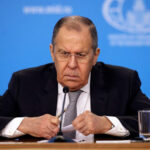
Opinion Washington has succumbed to dangerous groupthink on China
By Fareed Zakaria
Columnist
March 2, 2023 at 8:11 p.m. EST
Rep. Neal Dunn (R-Fla.), center, questions witnesses during a hearing of the House select committee on China on Capitol Hill on Tuesday. (Alex Brandon/AP)
We are often told that the United States is deeply divided, that polarization makes it impossible to make any progress in policy, and that our country is so internally conflicted that it cannot project unity and strength to the world. But on the most important foreign policy issue confronting policymakers, the problem is closer to the opposite. Washington has embraced a wide-ranging consensus on China that has turned into a classic example of groupthink.
To watch Tuesday’s hearing of the new House select committee on China was to be transported back to the 1950s. Members of both parties tried to outdo one another in their denunciations of China, describing — as committee chairman Mike Gallagher (R-Wis.) did — the Communist Party as an “existential” threat to the United States, and blaming it directly for every problem in America, from drug use to covid-19 to unemployment. (An odd charge since unemployment is currently at its lowest in more than 50 years.)
One could dismiss some of this more extreme rhetoric as the usual congressional grandstanding, but it creates a dynamic that makes rational policy difficult. Consider what happened a few weeks ago. The president of the United States, in what can only be described as a panic, ordered the U.S. military to shoot down three balloons that were probably private weather balloons — similar to hundreds of such objects in the sky around the world — that posed no threat to anyone. The sorts of balloons used by hobbyists and meteorological clubs can cost as little as $12. The missiles used to shoot down the recent offending objects cost more than $400,000 each. The shootdowns were ordered, of course, so that no one could claim Joe Biden was soft on China.
China is a serious strategic competitor, the most significant great-power challenger the United States has faced in many decades. That is all the more reason for Washington to shape a rational and considered foreign policy toward it — rather than one forged out of paranoia, hysteria and, above all, fears of being branded as soft. Whenever policy is made in those latter circumstances, as in the cases of Vietnam or Iraq, it turns out badly. In 2003, when then-Senate Minority Leader Tom Daschle (D-S.D.) tried to make the case for more diplomacy before war with Iraq, then-Speaker Dennis Hastert (R-Ill.) suggested Daschle was giving comfort to the enemy. The select committee on China spoke of those who dared to suggest improving relations with Beijing in similar terms.
Six years ago, before Donald Trump came into power, one would have described the U.S.-China relationship as difficult, perhaps even strained — and yet manageable, with regular dialogue between the two nations at the highest levels. When Washington confronted China on certain issues, such as currency manipulation and economic espionage, Beijing would make some effort to address the charges.
Today, U.S.-China relations are a mess. China continues to do things that alarm Washington but there is no discussion between the two sides. Beijing is actively supporting Russia economically and diplomatically in its war in Ukraine. Were that support to expand to include military assistance, Russia would gain an almost unlimited supply of armaments, transforming the war. Then-Speaker Nancy Pelosi’s August visit to Taiwan gave the People’s Liberation Army a golden opportunity to practice a multi-day blockade of the island, their most likely military intervention in the event of a crisis. Were current Speaker Kevin McCarthy (R-Calif.) to visit Taiwan, the PLA would likely use it as a pretext to practice a longer and more complete cutoff strategy, showing Taiwan that it could be isolated at will.
Most troubling of all, China has embarked on a serious program of nuclear modernization. For decades, Beijing took the position that its small nuclear arsenal — hovering at just over 200 warheads — was an adequate deterrent. The Chinese also routinely affirmed their “no first use” doctrine.
Today, Beijing’s warhead stockpile is estimated to be over 400, and China is on a path to more than triple that. Meanwhile, Russia has practically abandoned all nuclear arms control talks and treaties with the United States. As I’ve noted before, we face a new nuclear age in which two of the three largest arsenals on the planet are closely allied, with their missiles likely targeting the United States.
How much of this was inevitable? It’s hard to say. China has grown in power mightily since 2000. Back then, it accounted for almost 4 percent of global gross domestic product; today, that figure is about 18 percent. Its military expenditures have grown even faster. Xi Jinping is a far more aggressive leader than his predecessors.
But it is also true that U.S. policy has changed. Today, we have a strong bipartisan view of the allegedly existential danger posed by the Chinese Communist Party, which implies that regime change would be the only solution to this problem. But has this comfortable consensus created a more secure world for Americans (and others)? Or are we moving down a path that takes us toward decades of arms races, crises, perhaps even war?


